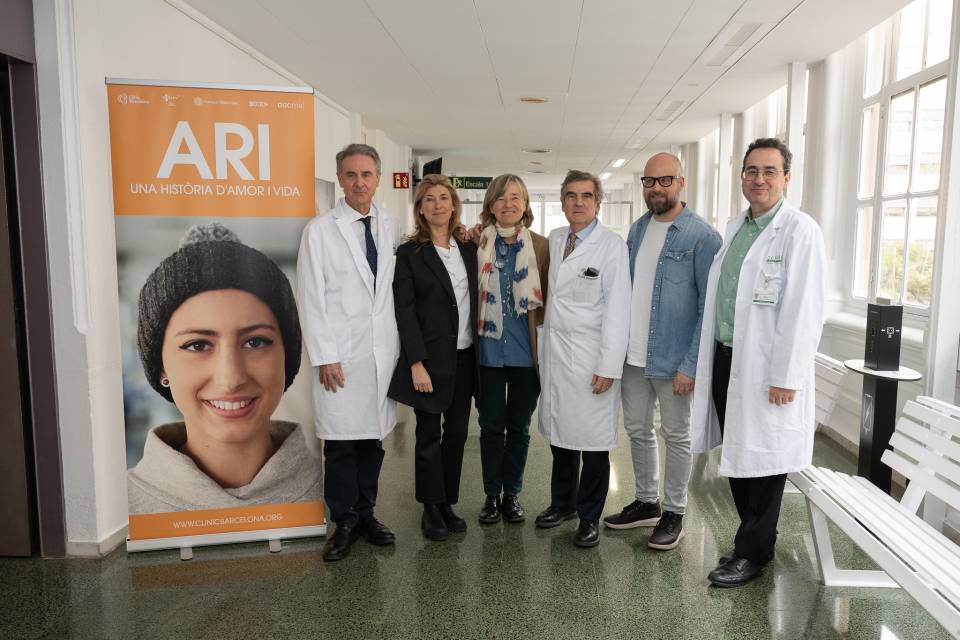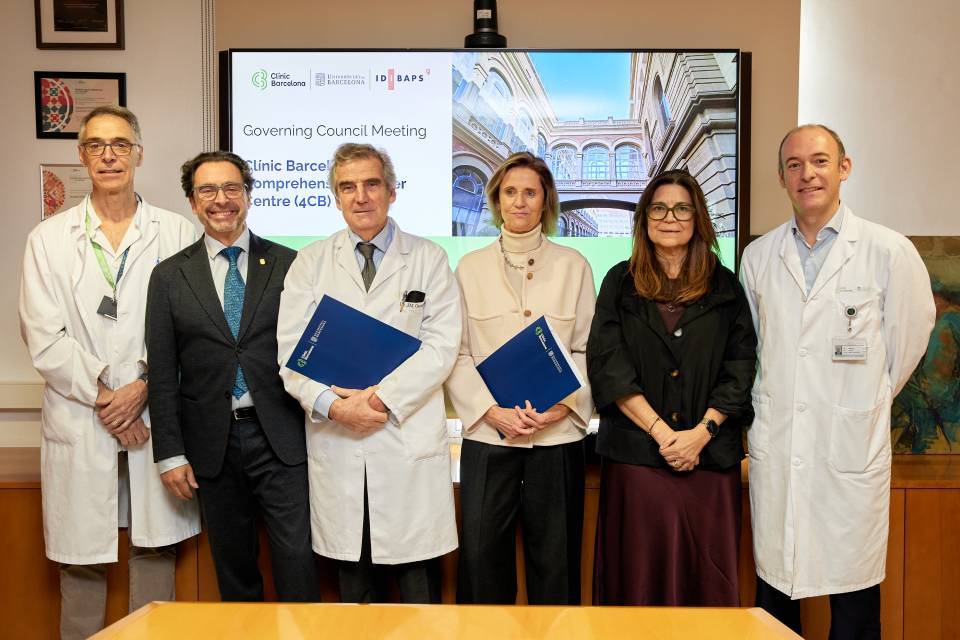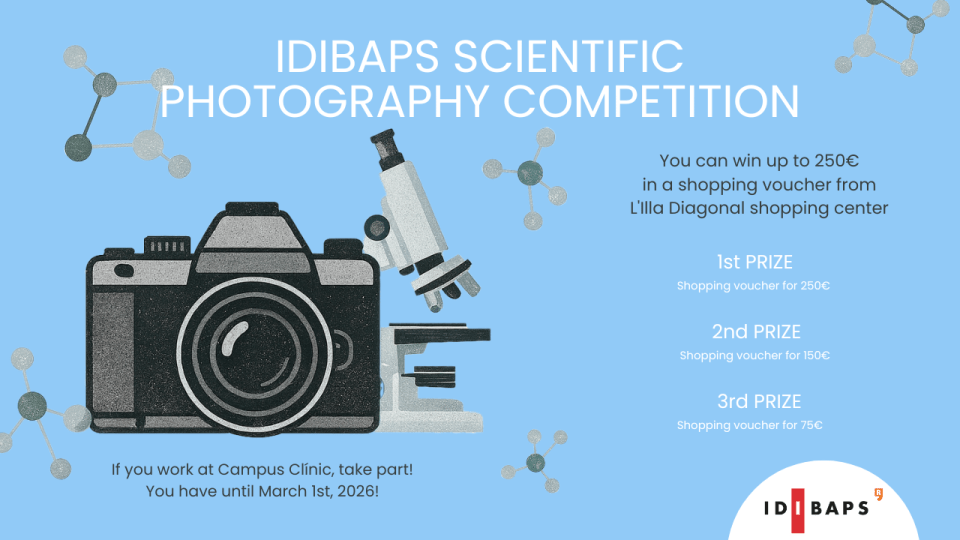The Hospital Clínic Barcelona has presented the documentary ‘ARI. Una història d’amor i vida’ (‘ARI. A story of love and life’), which tells the story of Ariana Benedé, Ari, and explains how a group of professionals from the Hospital Clínic-IDIBAPS succeeded in making CAR T-cell therapy a reality at the hospital. Tomorrow, after its première at the Mooby Bosque cinemas in Barcelona, the documentary will be available on the 3cat platform.
As part of this presentation, the Hospital Clínic-IDIBAPS has announced a new pioneering clinical trial of a new CAR T-cell therapy for lymphoma, ARI-0003. This is a dual-targeting CAR T-cell therapy and it recognizes two therapeutic targets on the malignant cells: CD-19 and BCMA. “It is the sum of the two CAR T-cell therapies the hospital already has, ARI-0001, targeting the lymphocyte receptor CD19, and ARI-0002h, which targets the BCMA receptor and is used to treat myeloma”, says Álvaro Urbano-Ispizua, coordinator of the hospital’s CAR-T Programme. , Thirty-five patients diagnosed with lymphoma will take part in this trial, which is to start next Tuesday.
The presentation press conference was attended by Dr. Josep M. Campistol, director general of the Hospital Clínic; Àngela Jover, Ariana Benedé’s mother and promoter of the ARI Project; Ricard Mamblona, co-director of the documentary; and Dr. Álvaro Urbano-Izpizúa, coordinator of the Hospital Clínic-IDIBAPS CAR-T Programme and Ariana Benedé’s doctor. The documentary, in which IDIBAPS collaborated, was produced by DOCME Films and made possible thanks to funding from the Glòria Soler Foundation.
“Ari’s presence in the film is more than a memory, it is a symbol of struggle and empowerment for all families facing the adversity of the disease. Unfortunately, part of the film represents those who are no longer here, but it also represents those who have now been able to benefit from treatment with CAR T-cell therapy, giving life to the dream that Ari pursued", says Ricard Mamblona.
Ari, the driving force behind the ARI Project
Ariana Benedé Jover (Barcelona, 28 October 1997 - 2 September 2016) was an activist against leukaemia and, along with her mother, Àngela Jover, the promoter of the ARI Project. Whilst she was studying 2n d’ESO (year 9 of secondary school) in Dublin, her life, and that of her environment, took an unexpected turn when, on her return home for an Easter holiday, she was diagnosed with acute lymphoblastic leukaemia at the Hospital de Sant Joan de Déu in Barcelona.
From then on, Ari had to face the disease, which, when she was 17 years old, took her to the Hospital Clínic where she received a bone marrow transplant after a relapse. These circumstances prompted her family to investigate which treatments could help her cope with her illness, such as CAR T-cell therapy, which at that time was only available in the United States.
“Ari was an example of struggle and motivation for many people. Her personality full of positive energy, her inner strength and her solidarity were the driving force behind a project that, over time, has become a source of hope for many”, explains Àngela Jover.
Although she was not able to benefit directly from the CAR T-cell therapy, she fought tirelessly to the very end in order to ensure that other patients could have this opportunity, which is now a reality. Her mother, Àngela Jover, gave the decisive impetus to the ARI Project, which allowed the clinical trial to begin with the CAR T-cell therapy ARI-0001 to treat acute lymphoblastic leukaemia.
In 2016, at the proposal of Josep Suñol Soler, the Board of Trustees of the Glòria Soler Foundation named
Ariana Benedé Jover a posthumous patron, for her solidarity, courage and generosity.
CAR T-cell therapy at the Hospital Clínic, an idea come true
It all started with the ARI Project. Not only the necessary financial resources, but also the motivation, the enthusiasm and the teamwork. Thanks to the funds raised, the Hospital Clínic was able to start carrying out CAR T-cell therapies. On 10 February 2021, the Spanish Agency of Medicines and Medical Devices (AEMPS) approved CAR-T ARI-0001, developed by the Hospital Clínic as a non-industrial, advanced therapy drug for use in patients over 25 years old with acute lymphoblastic leukaemia resistant to conventional treatment. This was the first CAR T developed entirely in Europe to be approved by a regulatory agency.
"The exceptional authorization for use by AEMPS was a milestone for our country, since it is the first therapy with genetically modified cells to achieve this. It was possible thanks to the joint effort by professionals and researchers, and we had the support of society, through the ARI Project”, points out Dr. Josep M. Campistol, director general of the Hospital Clínic.
Cell immunotherapy is one of the main lines of research carried out by the Hospital Clínic-IDIBAPS in order to develop new treatments that are available to treat patients with different types of solid tumours or haematological malignancies. On the other hand, research is also focused on improving the functionality of the CAR T-cell therapies once they reach the tumour.
In this respect, in addition to ARI-0001, to treat acute lymphoblastic leukaemia and lymphoma, ARI-0002h, for multiple myeloma and ARI-0003, for lymphoma, in the next few months a trial is also due to start with CAR T HER2 to treat breast cancer. The preclinical studies with the CAR T ARI-0007 to treat people diagnosed with T-cell acute lymphoblastic leukaemia have also finished.
ARI-0001 has been designated as "PRIME" (Priority Medicine in Europe) by the European Medicines Agency (EMA) for adult patients with acute lymphoblastic leukaemia. The Government of the Netherlands has donated resources (€35 million) to start a clinical trial in order to assess the efficacy of this CAR T compared to a commercial CAR T in patients with lymphoma.
Tumour-Infiltrating Lymphocyte (TIL) therapy is another type of cell-based therapy. The Hospital Clínic-IDIBAPS has now approved the TIL0001 trial, being one of the pioneering centres in the use of this type of therapy in Spain and Europe, for the treatment of breast cancer.
For the development of ARI-0001, the initial impetus by the Glòria Soler Foundation allowed for the incorporation of the necessary equipment for the manufacture of CAR T-cells. Help from the “la Caixa” Foundation and the Bosch i Aymerich Foundation were essential in the development of ARI-0002h.




